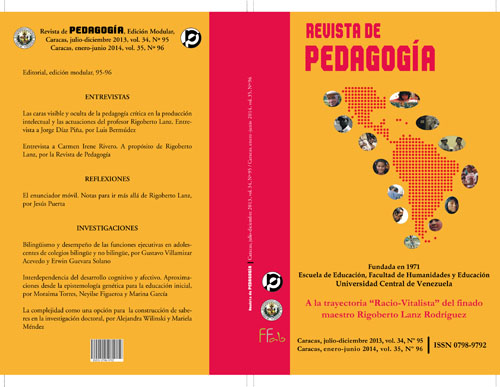INTERDEPENDENCIA DEL DESARROLLO COGNITIVO Y AFECTIVO. APROXIMACIONES DESDE LA EPISTEMOLOGÍA GENÉTICA PARA LA EDUCACIÓN INICIAL
Palabras clave:
Afectividad, Cognición, Desarrollo, Educación Inicial, Affection, Cognition, Development, Early Childhood EducationResumen
El propósito de este estudio es hacer una investigación hermenéutica a partir de la obra “Inteligencia y Afectividad” publicada por Piaget en 1954 y concretamente durante el período sensoriomotriz. En este sentido, nos proponemos comprender la tesis Piagetiana que señala que el desarrollo cognitivo y afectivo evolucionan de forma recíproca e interdependiente, por lo que se hace necesario trascender el mito de que lo cognitivo tiene más relevancia en el desarrollo que lo afectivo o viceversa; para explicar este postulado teórico se interpretarán registros retrospectivos que las autoras han resignificado a partir de su relación materno filial. Metodológicamente, se inserta en una investigación cualitativa, sustentada en el método hermenéutico y en la observación naturalística de orden introspectivo fenomenológico. Los sujetos fueron tres (3) infantes, un (1) niño y dos (2) niñas, que vivenciaron el período sensoriomotriz en su ciclo vital. Los instrumentos utilizados fueron registros descriptivos vinculados con la cotidianidad de los sujetos y elaborados mediante la técnica de recuerdo estimulado. Como aporte a las ciencias de la educación, el estudio procura generar algunos principios didácticos dirigidos a docentes de Educación Inicial específicamente para el nivel maternal (0-3 años).
INTERDEPENDENCE OF COGNITIVE AND AFFECTIVE DEVELOPMENT TEACHING APPROACHES FROM THE GENETIC EPISTEMOLOGY
Abstract:
The purpose of this study is to do some hermeneutics research from the book “Emotional Intelligence” published by Piaget in 1954. In this regard, we intend to understand the Piagetian thesis which points out that the cognitive and affective development evolves in a reciprocal and interdependent way, so it is necessary to transcend the myth that cognitivism is more relevant in developing affective issues or vice versa. In order to explain this theoretical postulate, retrospective records were interpreted by the authors, who have redefined their mother – child relationships with their children. The methodology to be used is inserted into a qualitative research method supported by the hermeneutical and naturalistic observation introspective phenomenological order. The subjects were three (3) children, B: 1, G: 2, who experienced the sensor-motor period in their lifecycles. The instruments used were descriptive records associated to the subjects’ daily routines and produced by the stimulating recall technique. As a contribution to science education, this study seeks to generate some teaching principles aimed at early education teachers (0-3 years).
Descargas
Descargas
Número
Sección
Licencia
Los autores que publican en la Revista de Pedagogía, están de acuerdo con los siguientes términos:
- Los autores conservan los derechos de autor y garantizan a la revista el derecho de ser la primera publicación del trabajo al igual que licenciado bajo una Creative Commons Attribution License que permite a otros compartir el trabajo con un reconocimiento de la autoría del trabajo y la publicación inicial en esta revista.
- Los autores pueden establecer por separado acuerdos adicionales para la distribución no exclusiva de la versión de la obra publicada en la revista (por ejemplo, situarlo en un repositorio institucional o publicarlo en un libro), con un reconocimiento de su publicación inicial en esta revista y no se use para fines comerciales.
- Los contenidos e imágenes que se incluyen en los artículos son responsabilidad del autor/es. Revista Digital del Doctorado en Educación de la Universidad Central de Venezuela no se hace responsable de la información incluida en ellos.
- Los autores están de acuerdo con la licencia de uso utilizada por la revista, con las condiciones de auto-archivo y con la política de acceso abierto.
- Se permite a los autores difundir electrónicamente (por ejemplo, en repositorios institucionales o en su propio sitio web) la versión publicada de sus obras, ya que favorece su circulación y difusión más temprana y con ello un posible aumento en su citación y alcance entre la comunidad académica.
- En caso de reutilización de las obras publicadas debe mencionarse la existencia y especificaciones de la licencia de uso además de mencionar la autoría y fuente original de su publicación.

